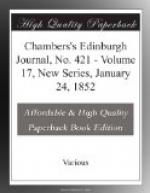We must draw breath as we approach the destination of the fifth and last instalment. It was to amount to four millions of millions of livres—about a hundred and seventy thousand millions of pounds. We take for granted that Fortune’s calculations are correct, and have certainly not taken the trouble of verifying them. Among other truly benevolent and cosmopolitan destinations of this very handsome sum, it may be sufficient to mention these:—
’Six thousand millions shall be appropriated towards paying the national debt of France, upon condition that the kings, our good lords and masters, shall be entreated to order the comptrollers-general of the finances to undergo in future an examination in arithmetic before they enter on the duties of their office.
’Twelve thousand millions shall likewise be employed in paying the public debts of England. It may be seen that I reckon that both these national debts will be doubled in this period—not that I have any doubt of the talents of certain ministers to increase them much more, but their operations in this way are opposed by an infinity of circumstances, which lead me to presume that these debts cannot be more than doubled. Besides, if they amount to a few thousands of millions more, I declare that it is my intention that they should be entirely paid off, and that a project so laudable should not remain unexecuted for a trifle more or less.’[1]
M. Ricard, it will be observed, must have drawn his will while royalty was in the ascendant; it was registered during the Reign of Terror, and one would be curious to know how many weeks, instead of centuries, his 500 livres remained sacred. Money in the most steadily-governed states—in our own, for instance—is subject to continual casualties. The most acute men of business cannot command perfectly certain investments for their own money—they are often miserably deceived, and suffer heavy losses. M. Ricard, however, supposed that a set of irresponsible trustees would for centuries always discover perfectly sure investments, and act with consummate watchfulness and honesty. If it were possible to leave behind one money with the qualification of always being securely invested, while the rest of the property in the world remained insecure, it would gradually suck all the wealth of the world into its vortex. But it would require supernatural agency to make it thus absolutely secure.
* * * * *
[Footnote 1: See the will at length in the appendix to Lord Lauderdale’s Inquiry into the Nature and Origin of Public Wealth.]
SIR FRANCIS HEAD’S ’FAGGOT.’[2]
‘A faggot of French Sticks’ is the whimsical title of a work just presented to the public, by the author of Bubbles from the Brunnen of Nassau; the said work being as respectable a specimen of bookmaking as has ever come under our notice. The object of the writer appears to have been to fill so much paper, by saying something about all he saw or heard of in a visit to Paris, no matter how insignificant the circumstances; and by this ingenious means, he has actually contrived to make up two goodly-sized volumes for the literary market.




